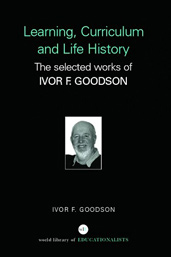Learning, Curriculum and Life Politics: the selected works of Ivor F. Goodson
Towards an Alternative Pedagogy
A number of examples of work based on this kind of pedagogic ideal are already in operation. An important minority of 'progressive' teachers in British primary schools and a growing body in middle schools already work an alternative pedagogy:
At her best the primary school teacher working in a more or less progressive English primary school is perhaps the only contemporary polymath, even if to herself she seems more like a ‘jack of all trades’. She is something of an expert in the psychology of learning and the nature of childhood, passionately committed to intellectual exploration within the most widely ranging areas of experience, rarely afraid to tackle, at the invitation of her pupils, new disciplines, and often the master of some particular part of experience which she teaches - art or nature or language. Doubtless to put it so badly is to idealize, but it is an idealization drawn from life (Armstrong 1974, p. 56).
The guiding principle of this primary school tradition is 'intellectual exploration' - a working plan of principles of procedure will be needed to facilitate such exploration together with predictions as to worthwhile activities and useful resources.
The American Social Science Curriculum, Man: A Course of Study, on which Bruner acted as consultant goes some way towards defining principles of procedure for an alternative pedagogy:
-
To initiate and develop in youngsters a process of question-posing (the inquiry method).
- To teach a research methodology where children can look for information to answer questions they have raised and used the framework developed in the course (e.g. the concept of the life cycle) and apply it to new areas.
- To help youngsters develop the ability to use a variety of first-hand sources as evidence from which to develop hypotheses and draw conclusions.
- To conduct classroom discussions in which youngsters learn to listen to others as well as express their own view.
- To legitimate the search: that is, to give sanction and support to open-ended discussions where definitive answers to many questions are not found.
- To encourage children to reflect on their own experiences (Hanley, Whitla, Moo and Walter 1970, p. 5).
Whilst not wishing to recommend the whole of Bruner's curriculum package as exemplifying an alternative pedagogy, this definition of principle does offer useful guidelines of a broad plan of interaction.
